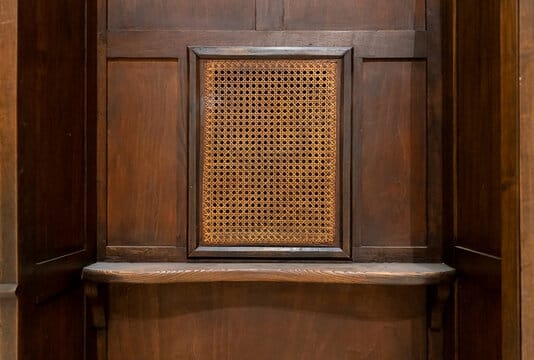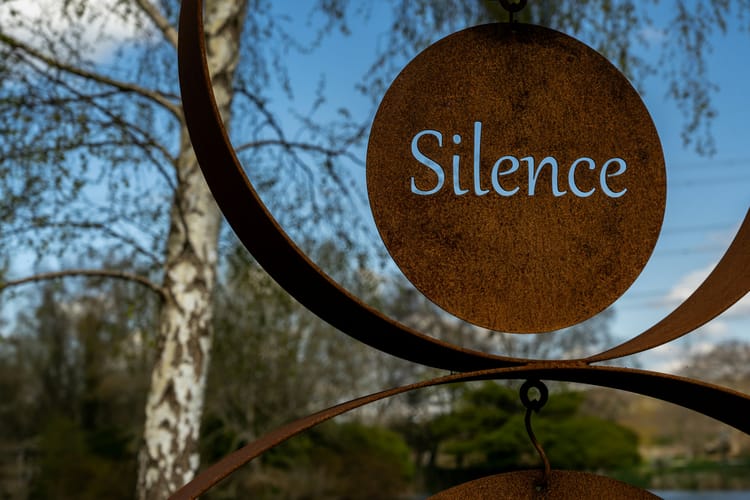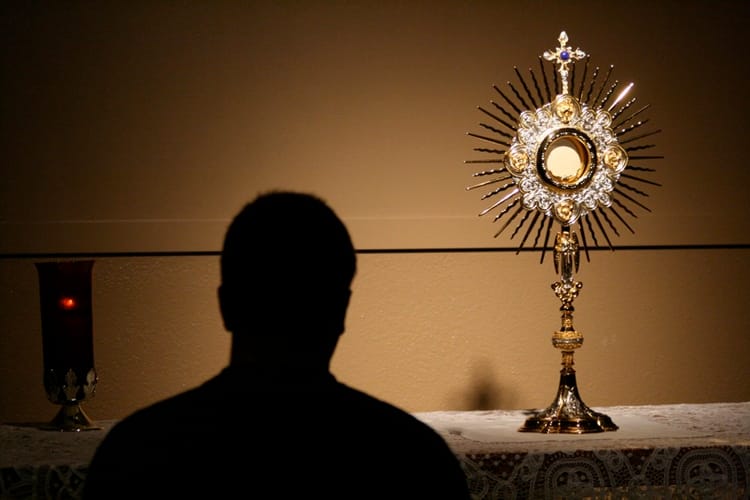Confession: A System, Not an Event

Like the Liturgy of the Hours or certain devotions, regular confession is often praised as a good and pious thing. But ask people why, and the answers often feel vague or insufficient.
Yes, the saints went to confession frequently. But they often did so under the guidance of a spiritual advisor—someone who knew them intimately, understood their weaknesses, and helped devise real, concrete strategies to fight sin and grow in virtue.
Most of us don’t have that kind of relationship with a priest. In fact, many of us barely know the name of the priest behind the screen, let alone share the kind of spiritual intimacy St. Teresa of Ávila or John Paul II had with their confessors.
I’ll be honest: I think a lot of Catholics repeat advice about frequent confession without really understanding the context or the why. At the same time, I suspect many others have tried to go more often, only to find themselves struggling to come up with anything “worth confessing” by week two. They feel like they’re wasting the priest’s time or clogging up the Saturday line while others wait.
So what gives? Why do some people go regularly and find it deeply fruitful, while others either avoid it altogether or feel like they’re just repeating vague faults to check a box?
Here’s my working theory:
Those who avoid confession don’t know themselves well enough, and those who go often have learned to examine their lives clearly.
There’s a vast middle ground of Catholics who want to grow but haven’t yet learned how to see their sins—not just the obvious, mortal ones, but the slow, subtle rot of habitual sin, selfishness, and unchecked interior movements.
This Isn’t a “How to Make a Good Confession” Post
You’ve read those before. And they’re helpful—when the time comes, you should know how to make a sincere, contrite confession.
But that’s not what this is.
This is about creating a system: a spiritual structure that supports growth over time.
Confession, when paired with regular examinations of conscience, becomes more than a reset button. It becomes a complementary training program for the soul and will.
Think of it like this:
- The confession is the checkpoint where grace is poured out.
- The examen is the daily training session where awareness, repentance, and resolve are forged.
Together, they create a feedback loop—one that gradually reforms your interior life.
The More You Know About Sin, the More You'll See It
If you’re not sure where to start, begin with this: study sin.
Seriously. Read the Catechism on sin. Learn how the enemy operates. Read spiritual masters like St. John of the Cross, St. Teresa of Ávila, or Fr. Jacques Philippe.
Once you understand the enemy and the battlefield, your vision will sharpen. You’ll begin to spot patterns, weak points, triggers.
And that’s when your confessions start getting real.
Track Your Sin Like You Track Your Workouts
You don’t walk into the gym with no plan and expect results. Same goes for the confessional.
If you want to take your spiritual life seriously, you need a system. Here’s one I suggest:
- Keep a running list of your habitual sins. Be honest, specific, and concise.
- Track triggers and victories. What preceded your fall? What helped you resist?
- Make note of sins of omission. Where did you fail to act, to speak up, to love?
- Use your nightly examen to update the list. Keep it prayerful, not neurotic.
When you track like this, you’re not going into the confessional winging it. You’re reporting for duty with self-knowledge and humility.
Start Preparing for Your Next Confession the Night of the Last One
I know, that sounds extreme. But hear me out.
You likely didn’t commit mortal sin between saying your penance and brushing your teeth—but chances are, something went unguarded: a sharp word, a selfish impulse, a distracted prayer.
Pope John Paul II went to confession once a week. Not because he was idle or scrupulous—but because he knew how easily the heart drifts from God.
That’s why a nightly examination of conscience should be the bare minimum for any serious Christian. Not out of guilt, but to stay awake. To train your heart to recognize when you’ve chosen comfort over courage, pride over humility, self over God.
If you’re battling habitual or serious sin, consider adding a midday check-in—a pause, even just for 60 seconds, to ask:
Where have I been tempted? How am I doing? What do I need right now, Lord?
Pray with a Purpose
Ask for grace, strength, and clarity. Ask specific saints to walk with you—Padre Pio is a great all-around spiritual companion, especially for matters of confession and spiritual warfare.
You can also choose saints whose struggles mirror yours:
- Joseph for purity
- Augustine for restlessness
- Mary Magdalene for wounds
- Dismas (the Good Thief) for hard-won repentance
Put It on the Calendar
Confession is a sacrament—that means grace is guaranteed. But so is resistance and forgetfulness. If you don’t schedule it, you’ll postpone it.
Once or twice a month is an excellent rhythm for most people. More if you need it. Tie it to a calendar reminder, a First Friday, or even payday if that helps.
Build your life around grace, not just convenience.
Final Thought
This isn’t about guilt. It’s about awareness. Discipline. And most of all, freedom.
The better you know your own heart, the more powerful confession becomes.
And the more powerful confession becomes, the freer you’ll be to love.
Want help setting up a simple template for tracking your sins or doing a nightly examen? Message me. I’ll be happy to share what’s worked for me.





Member discussion